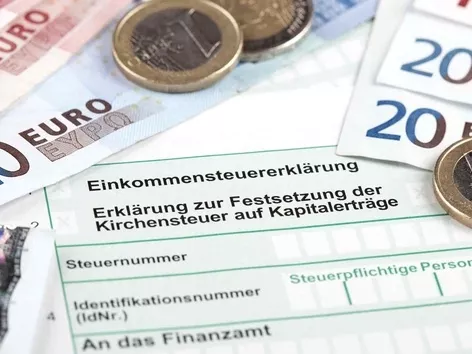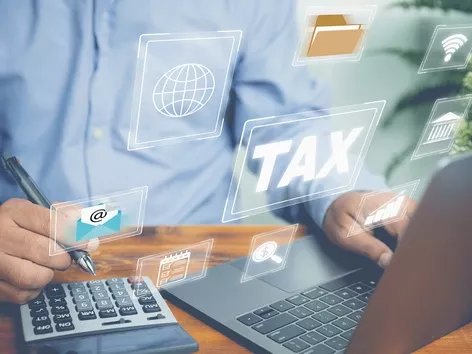How can an expat file a declaration in Germany and get their taxes back?
Table of contents
- Tax declaration in Germany - what is it?
- Is it mandatory to fill out an income declaration in Germany?
- What is a tax refund in Germany?
- Who and how much tax can be refunded in Germany?
- What other benefits can be obtained after filling out the declaration?
- Can a foreigner submit a declaration in Germany independently?

Foreigners working in Germany must submit a declaration every year to verify the amount of taxes paid. Find out the procedure for submitting a declaration and how expats can get back overpaid taxes
Germany is among the top three in the world in terms of the number of expats. In 2023, approximately 13.9 million foreigners lived in the country. The state can also be considered a real magnet for international talent: by the end of 2023, a record 419,000 people received temporary work permits here, almost 49% of the skilled workforce in Germany are foreigners. These data demonstrate that, thanks to the stable economy, Germany is a promising destination for expat employment.
However, when planning to move to this country, it is worth considering that German legislation may differ significantly from the conditions in the country of origin. In Germany, in particular, it is mandatory to submit an annual income declaration. However, such a requirement can provide certain advantages, because in most cases, filing a declaration leads to a tax refund.
What is an annual income statement? How to get a tax refund in Germany? Details in this article.
Tax declaration in Germany - what is it?
Most taxpayers in Germany, both foreigners and German citizens, submit an annual tax return (Einkommensteuererklärung) to the Federal Central Tax Office. When submitting this return, you first check whether you have paid the correct amount of tax for the previous financial year.
Is it mandatory to fill out an income declaration in Germany?
All foreigners who have spent more than 183 days in Germany per year are required to fill out a tax return. If the period of stay is shorter, you yourself decide whether to submit a declaration or not.
The benefits of filing an income tax return are a tax refund and an additional benefit. The rate of tax refunds in Germany is quite high, with approximately 90% of people who file an income tax return receiving a refund.
To move, travel or work safely in a new country, you will need health insurance. You can apply for an extended policy on our website here.
What is a tax refund in Germany?
The salary of each employee in Germany consists of two parts:
- the actual income received by the employee;
- income tax, which employers pay to the state tax service.
The percentage of the salary that goes to the tax authorities is the amount of the advance payment. After the end of each calendar year, all employed people in the state, both Germans and foreigners, fill out an income declaration, where all information about work and taxes is indicated.
Experts say that in 9 out of 10 cases, your employer pays more tax to the government than it actually has because they usually pay the same amount for everyone.
The advantage is that after submitting the declaration, the expat can get back the overpaid funds.
What is a tax refund and when an expat can get the right to a refund, read in this article.
Who and how much tax can be refunded in Germany?
Both citizens and foreigners have the right to a tax refund in Germany. The average refund amount in Germany is 1,072 euros. To calculate the approximate amount of the refund for yourself, use a special calculator.
What other benefits can be obtained after filling out the declaration?
In addition to reimbursement of expenses, a number of additional benefits are provided in Germany. One such benefit that you should take advantage of is baby money. Germany provides child benefit of up to €250 per child, provided that at least one parent works in the country. The category of children includes all persons under the age of 18 and people under the age of 25, if they do not have a job.
Can a foreigner submit a declaration in Germany independently?
A foreigner can submit a declaration independently, but for this it is necessary to have a good command of the German language and to know the intricacies of local legislation.
That is why most experienced expats cooperate with tax experts, one of the best is RT TAX. Founded in 2000, the company occupies a leading position in the field of tax refunds worldwide. The network has more than 400 representative offices in 40 countries. Over the entire period of work, 250,000 workers from all over the world became clients of the agent.
The main advantage of RT TAX is that the company works on the basis of a successful commission, which means that clients pay for services only when they receive a refund, without the need for an upfront payment.
We will remind you! Expats moving abroad admit that getting a job and paying taxes is a complicated system. We talked about the peculiarities of the taxation system and methods of employment outside one's country earlier.
Ihor Usyk - head of Visit World's legal department
When working abroad, expats often have various legal issues, because the legislation of each country is special. Consulting a specialist will help you understand all the intricacies of labor law. A labor and business lawyer is your reliable assistant in solving simple and complex issues in any corner of the world.
Products from Visit World for a comfortable trip:
Checklist for obtaining a visa and necessary documents in Germany;
Legal advice on business issues in Germany;
Travel insurance for foreigners in Germany;
Medical insurance around the world.
We monitor the accuracy and relevance of our information, so if you notice any errors or inconsistencies, please contact our hotline.
Frequantly
asked questions
What is an electronic tax return in Germany?
What is the tax rate for non-residents of Germany?
Can I get my taxes back if I leave Germany?
Recommended articles
3 min
Expats
Ranking of countries with the lowest taxes for foreigners in 2024
There are many countries around the world that attract foreign investors and businessmen with their lenient tax policies. These countries offer a wide range of benefits, making them an ideal place to do business and invest. Learn more about the countries with the lowest taxes for foreigners in 2024
18 Sep. 2024
More details2 min
Work
Termination of an employment contract in Germany: when and how can an employer fire you?
Germany attracts expats with career growth prospects and a high standard of living. However, when planning employment in another country, it is necessary to study the local legislation in detail. Understanding the procedure for terminating an employment contract is an important stage of work. Find out under what circumstances you can be fired by your German employer and how it happens
24 Jul. 2024
More details2 min
Expats
Taxes for expats: what you need to know when moving abroad?
Moving abroad is always a challenge. Expats who move to other countries admit that finding employment and paying taxes is a complicated system. Find out what features of the taxation system should be taken into account when working outside your country
14 Sep. 2024
More details1 min
Travels
Since September 16, Germany has introduced border controls at all its land borders. Inspections will be valid temporarily for six months. Find out why the country decided to approve the new rules and how the requirements for travelers will change
20 Sep. 2024
More detailsAll materials and articles are owned by VisitWorld.Today and are protected by international intellectual property regulations. When using materials, approval from VisitWorld.Today is required.
